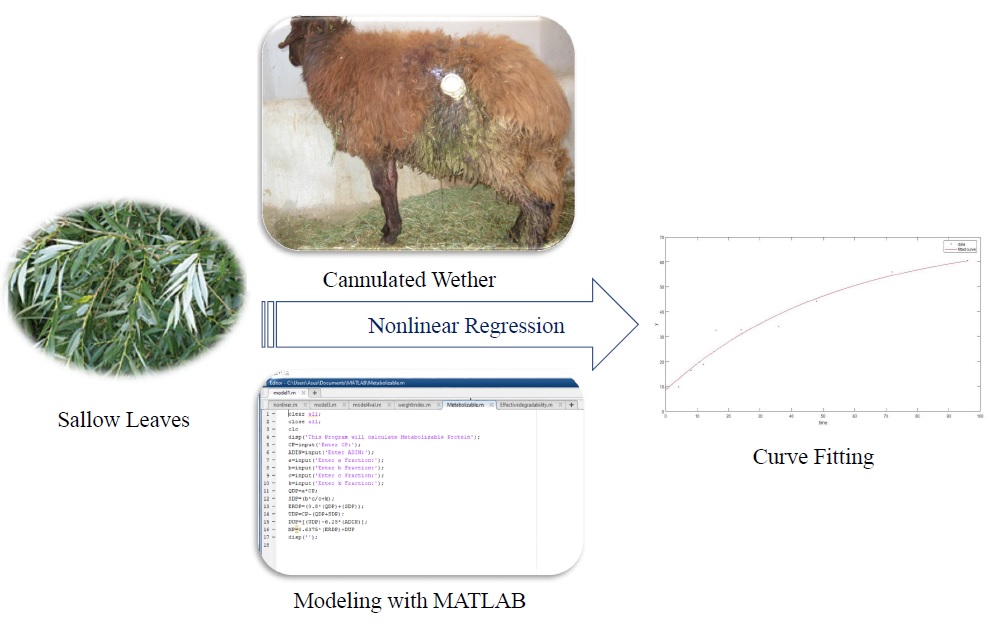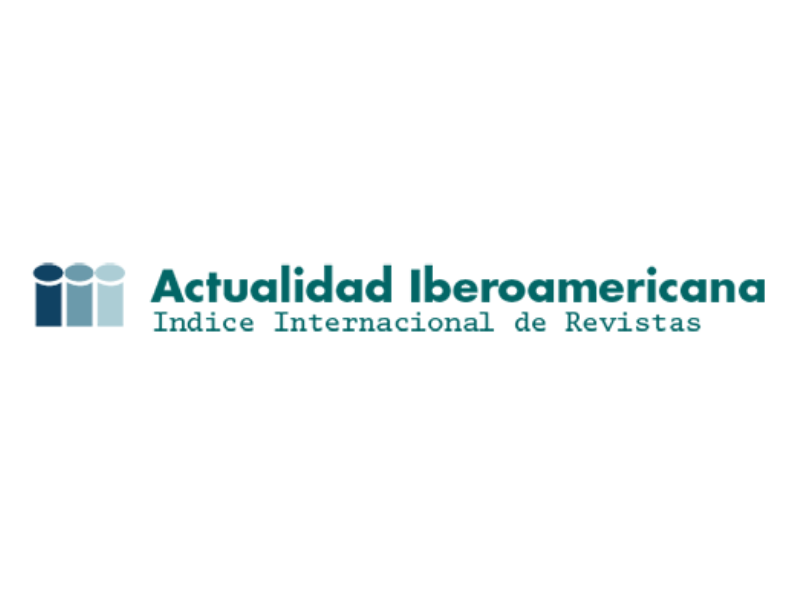In situ ruminal degradation of sallow tree leaves using different mathematical models
Degradación ruminal in situ de hojas de árboles cetrinos utilizando diferentes modelos matemáticos

Show authors biography
Objective. The objective of this study was to determine the in situ digestion parameters of sallow leaves (Salix Alba) as an alternative food, not commonly used in animal diets using mathematical models. Materials and methods. Four mathematical models were used to describe the ruminal disappearance of dry matter (DM) and crude protein (CP) of sallow leaves: non lagged exponential (Model I); lagged exponential (Model II); Gompertz (Model III), and generalized Mitscherlich (Model IV). Results. Results of DM and CP degradability characteristics showed that all the models fitted well (r2>0.98) to the disappearance data. There were minor differences between the models in terms of statistical evaluations. However, the models differed in the estimated parameters depending on the model’s nature and structure and the parameters included. Conclusions. Given that some models estimated negative values for the studied parameters, they were not biologically acceptable. For this reason, the only model I can be used for estimating the degradability of DM and CP of sallow leaves. In terms of effective degradability (ED) of DM, model III was not used in the calculations because of calculating negative values for part A. Sallow leaves constitute the largest possible proportion of the ruminal degradability fractions, and effective degradability can be used as a forage source in ruminant feeds.
Article visits 645 | PDF visits
Downloads
- Ebeid HM, Kholif AE, Chrenkova M, Anele U. Ruminal fermentation kinetics of Moringa oleifera leaf and seed as protein feeds in dairy cow diets: in sacco degradability and protein and fiber fractions assessed by the CNCPS method. Agrofor Sys. 2019; https://doi.org/10.1007/s10457-019-00456-7
- Mune MAM, Nyobe EC, Bassogog CB, Minka SR. A comparison on the nutritional quality of proteins from Moringa oleifera leaves and seeds. Coge Food Agric. 2016; https://doi.org/10.1080/23311932.2016.1213618
- Obeidat BS, Kridli RT, Mahmoud KZ, Obeidat MD, Haddad SG, Subih HS, Al-Khazáleh JM. Replacing Soybean Meal with Sesame Meal in the Diets of Lactating Awassi Ewes Suckling Single Lambs: Nutrient Digestibility, Milk Production, and Lamb Growth. Animals. 2019; 9(4):157. https://doi.org/10.3390/ani9040157
- Mishra B, Varjani S, Varma GKS. Agro-industrial by-products in the synthesis of food grade microbial pigments: An eco-friendly alternative. In Green Bio-processes. Springer, Singapore. 2019; https://doi.org/10.1007/978-981-13-3263-0_13
- Palangi V, Khoshvaghti H, Sharafi Y, Eivazi P. Determination of nutritive value of Sallow and Service leaves using nylon bags and gas production techniques. Ind J Anim Res. 2012; 40:361-365. https://arccjournals.com/journal/indian-journal-of-animal-research/ARCC480
- Palangi V, Taghizadeh A, Sadeghzadeh MK. Determine of nutritive value of dried citrus pulp various using in situ and gas production techniques. J Biodivers Environ Sci. 2013; 3:8-16. https://innspub.net/wp-content/uploads/2013/06/JBES-Vol3No6-p8-16.pdf
- Palangi V, Macit M. In situ crude protein and dry matter ruminal degradability of heat-treated barley. Rev Méd Vét. 2019; 170:123-128. https://www.revmedvet.com/2019/RMV170_123_128.pdf
- Palangi V, Macit M, Bayat AR. Comparison of mathematical models describing disappearance curves from the in sacco technique for incubating lucerne hay cuts in the rumen. South Afric J Anim Sci. 2020, 50(5):719-715. http://dx.doi.org/10.4314/sajas.v50i5.9
- Dhanoa MS, France J, Siddons RC, Lopez S, Buchanan SJG. A non-linear compartmental model to describe for age degradation kinetics during incubation in polyester bags in the rumen. British J Nut. 1995; 73:3-15. https://doi.org/10.1079/BJN19950004
- France J, Thornley JHM, Lopez S, Siddons RC, Dhanoa MS, Van Soest PJ, Gill M. On the two-compartment model for estimating extent of feed degradation in the rumen. J Theo Biol. 1990; 146:269–287. https://doi.org/10.1016/S0022-5193(05)80139-0
- Ørskov ER, McDonald I. The estimation of protein degrability in the rumen from incubation measurements weighted according to rate of passage. J Agric Sci. 1979; 92:499-503. https://doi.org/10.1017/S0021859600063048
- Çavdar T, Mohammad M, Milani R A. A new heuristic approach for inverse kinematics of robot arms. Adv Sci Lett. 2013; 19(1):329-333. https://doi.org/10.1166/asl.2013.4700
- Palangi V, Besharati M. Validation of in situ disappearance curves utilizing mathematical models for incubating fish meal and cottonseed meal. Semin. Ciênc. Agrár. 2020; 41(6Supl2): 3391-3396. https://doi.org/10.5433/16790359.2020v41n6Supl2p3391
- Ørskov ER, Hovel FDB, Mould FL. The use of the nylon bag technique for evaluation of feedstuffs. Trop Anim Prod. 1980; 5:195-213. http://www.fao.org/WAICENT/faoINFO/AGRICULT/AGA/AGAP/FRG/TAP53/53_1.pdf
- Yanez Ruiz DR, Martin Garcia AI, Moumen A, Molina Alcaide E. Ruminal fermentation and degradation patterns protozoa population and urinary purine derivatives excretion in goats and wethers fed diets based on olive leaves. J Anim Sci. 2004; 82(7):2023–2032. https://doi.org/10.2527/2004.8272023x
- Elahi MY, Rouzbehan Y. Characteriztion of quercus persica, quercus infectorica and quercus libani as ruminant feeds. Anim Feed Sci Technol. 2008; 140:78-89. https://doi.org/10.1016/j.anifeedsci.2007.02.009
- Waghorn GC, Shelton ID, McNabb WC, McCutcheon SN. Effects of condensed tannins in Lotus pedunculatus on its nutritive value for sheep. 2. Nitrogenous aspects. J Agric Sci. 1994; 123:109-119. https://doi.org/10.1017/S0021859600067836























